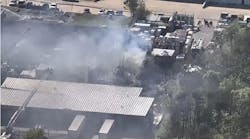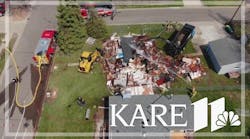Nov. 19--Helen Rosenbaum was shocked to walk out of her Ventnor home two days after Hurricane Sandy and see her car on fire -- and the fire spreading to the siding on her house.
She was more shocked when her local fire department told her what probably caused the fire in a car that wouldn't start after it got flooded in the storm -- water.
Specifically, it was saltwater that got into the wires and ignited the 2004 Subaru Forester, but fire investigators say saltwater residue in electrical wires can spark fires in almost any vehicle. And in at least four cases across Atlantic County during and after last month's hurricane, fires that started in cars spread to houses.
Brigantine Fire Chief Jim Holl says two house fires started that way in his town, as the storm was still on.
"It usually happens with newer vehicles that have advanced electronics," Holl said. "Most people would think that if a vehicle was submerged, there would be no fire. ... But almost everything in (modern cars) is plastic and hydrocarbon-based material, so the fires burn very hot and very quickly. I don't know how common it is, but we had two in one night."
Atlantic County Fire Marshal Whitey Swartz said a similar fire spread from a vehicle to a home in the Oaks at Weymouth development in Weymouth Township.
Saltwater "corrodes the (wire) connections ... and when you activate the electrical system, it starts sparking and sparking, gets hotter and hotter, and you have a fire," Swartz said Sunday. "Saltwater is sort of an acid that eats away at metal, particularly aluminum and copper wires."
The salt that stays on the wires after the flooding is also a good conductor of electricity, Swartz adds. Exposure to any kind of water can cause corrosion in metal wires, and eventually lead to a fire risk, but "saltwater is the bad stuff," the fire marshal said.
In Ventnor, Rosenbaum and her friend, Catherine Basile -- who also lost her car, because the fire spread to the 2008 Toyota parked behind the Subaru -- said the Subaru wasn't turned on when it ignited. But they had been in and out of the flooded car to try to dry out the floor mats.
Just activating the interior light switches by opening a door could spark a fire, Swartz said. Turning on the headlights could do the same, as could anything that turns on an electric switch.
But in his experience, these fires aren't just a problem in late-model vehicles. Swartz remembered the same thing happening after the March 1962 northeaster caused widespread flooding around coastal New Jersey.
Ventnor Fire Capt. Jim Culbertson said his father, also a firefighter, lost his beloved 1957 Chevrolet to fire months after the Chevy dried out from the '62 storm. So he wasn't shocked to be called to car fires after Sandy's water subsided. But Culbertson, Ventnor's fire investigator, was surprised by how many fires apparently started the same way.
He advises parking cars farther from houses at times when flooding is expected -- despite the fact that many people want to park as close as they can to the building, so they can get in and out of their cars if needed without going far out into the weather.
In Brigantine, Holl too said he plans to encourage residents to park far enough from their homes that a car fire can't spread to the house. But, he said, another lesson of Sandy is that when major flooding is predicted from a storm, people should get their cars much farther away from their homes -- by following mandatory evacuation orders and leaving barrier islands.
And for vehicles that stay in flood-prone areas, Culbertson has another suggestion.
"If you're not parking them in the street, then disconnecting the battery terminal is good advice," he said.
Saltwater electrical fires aren't just a danger in cars, Culbertson and Swartz said. The same kind of fires can start in appliances that were flooded in the storm -- even ones that seemed to work fine when they dried out.
"If you have any wiring in your house that's been under water," Swartz said, "before you do anything, get a licensed electrician in there and check it."
Culbertson said anything that uses batteries or has electronic wires that was exposed to saltwater should be checked, and repaired or replaced.
Make sure all smoke and carbon-monoxide detectors are in good working order, he warned -- because if you had saltwater in your home, you may need them soon.
Contact Martin DeAngelis:
609-272-7237
Copyright 2012 - The Press of Atlantic City, Pleasantville, N.J.







